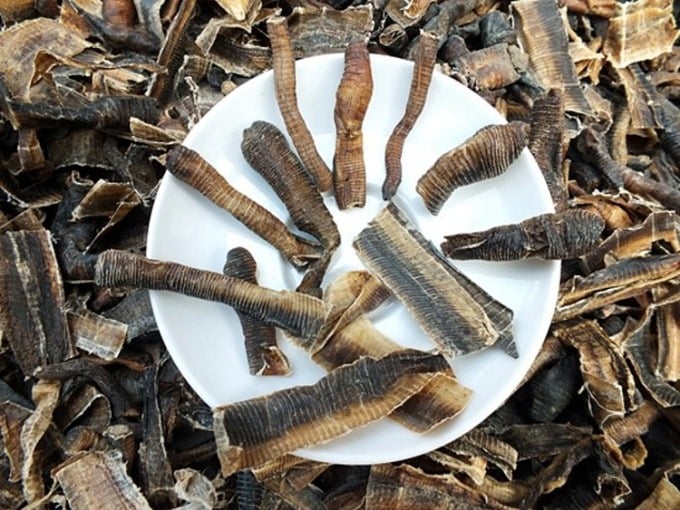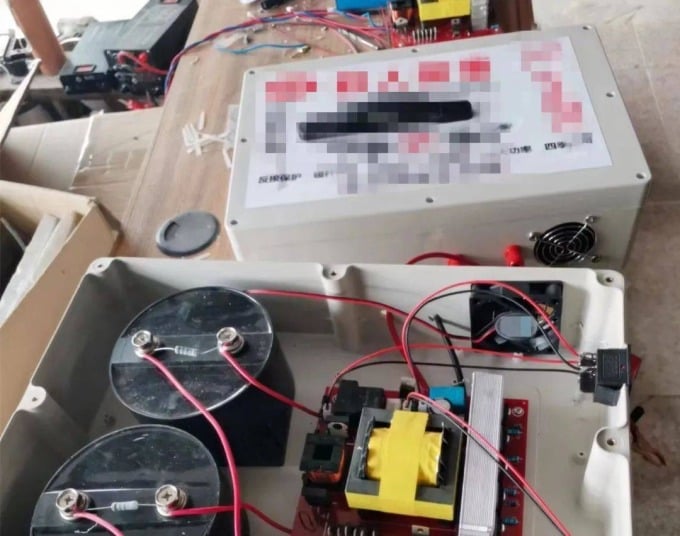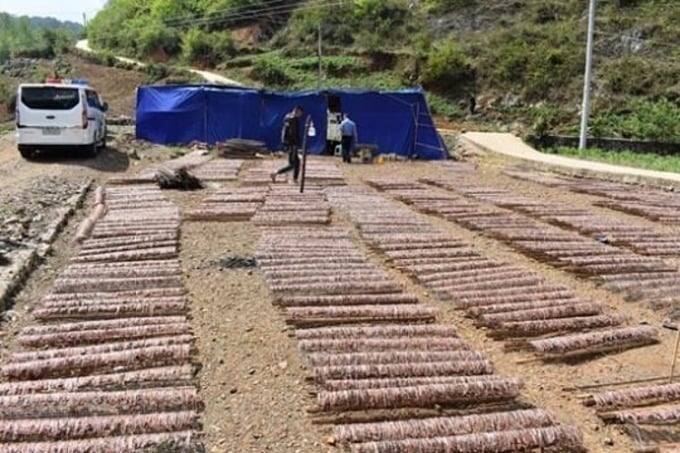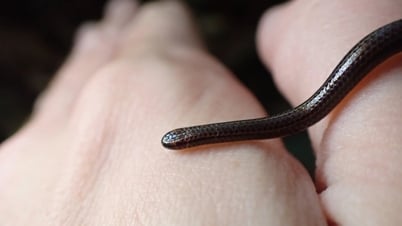Many Chinese people buy earthworms to use in traditional Chinese medicine to treat cardiovascular diseases, leading to increasingly serious hunting and electrofishing practices targeting these creatures.
The practice of electrofishing earthworms has been rampant in the past month in provinces such as Hoa Binh, Bac Giang , Son La, Tuyen Quang, and Bac Giang. Hunters use a device consisting of two pointed rods connected to a high-capacity battery or power pack, which they insert into the ground, causing all the earthworms within a one-square-meter area to emerge.
The harvested worms are gutted, dried, and sold to distributors who ship them to China for about 600,000 VND per kilogram.
In China, earthworms are known as "dilong" (earth dragon) and have been considered an ingredient in traditional medicine for nearly 2,000 years. The Chinese Pharmacopoeia states that earthworms have the effects of "clearing heat, calming, moistening the lungs, and promoting diuresis."
The practice of using electric shock to hunt earthworms has also recently surged in some parts of China for sale to traditional Chinese medicine processing facilities, according to a Xinhua report from July 2022.
Those who electrofish say that an increasing number of patients with cardiovascular and cerebrovascular diseases in China need to use earthworms as medicine. This high demand has led to hundreds of thousands of tons of earthworms being hunted using electrofishing in the country.

Dried earthworms, a key ingredient in many traditional Chinese medicines. Photo: Xinhua
Worm hunters use a "Earthworm-catching machine," which consists of a battery connected to two pointed rods, similar to those used in Vietnam. Liu Lianxin, a farmer in Shangqiu, Henan province, with over 20 years of experience catching worms, says that the practice of using worm-catching devices usually flourishes in the spring, when earthworms emerge.
At those times, the sound of the earthworm harvesting machine echoed throughout the rice fields, vegetable gardens, parks, riverbanks, and even in the forest. Many people watching this modern earthworm harvesting technology said their legs went "numb" from the electricity.
During the hot, dry summer months, when there is little rain, earthworms burrow deeper into the ground, but there are still groups of people who use earthworm harvesting machines to catch them. They usually operate at night, carrying lights, buckets, and wearing boots. A friend of Liu Lianxin lamented to her, "Lately, I've searched all around my house and haven't found any earthworms."
Worm collectors are not only found in Henan, but also in Suzhou in Anhui province, Xuzhou in Jiangsu, the mountainous region between Guangdong and Guangxi provinces, the primeval forests of Guizhou and Yunnan, and the rubber forests of Hainan.
Users of earthworm harvesting machines can catch hundreds of pounds of fresh earthworms daily, then clean the internal organs and dry them. Ten pounds of fresh worms yield one pound of dried worms, which sell for around 180-240 yuan (25-33 USD), depending on the type and quality.
Over 20 years ago, when Liu Yulian first started her career, she used a hoe to dig up worms, then used a razor blade to cut open their bellies and dried them on the brick courtyard. At that time, dried worms cost about 20 yuan per kilogram.
"You can dig up 20 kg of worms a day, but it's not much money, so few people do this job," Mrs. Luu said.
But over the past 20 years, the price of earthworms has increased tenfold. In 2021, dried earthworms at one point reached 275 yuan/kg (US$38), when market demand surged.
Bozhou City, Anhui Province, is known as the "medicinal herb capital of China" and is the world's largest market for Chinese herbal medicine. Mr. Chen, a trader in Bozhou, said he buys wild earthworms from Guangxi, Sichuan, Anhui, and Henan provinces, and then sells them to pharmaceutical factories.
According to 2021 data, over 57% of earthworms sold on the market are used by pharmaceutical factories, traditional medicine pharmacies import about 28.5%, and the remainder is used for export and functional foods.
China has 40 pharmaceutical products containing earthworm extract, notably cough medicine, headache and chest pain relief tablets, and anti-inflammatory tablets. The company that uses the most earthworms is a pharmaceutical company in Shaanxi, which produces cardiovascular and cerebrovascular drugs, including brain-enhancing capsules.
A report on cardiovascular diseases published by China last year showed that two out of every five deaths in the country in 2021 were due to cardiovascular disease. The incidence of cardiovascular disease in China has also been steadily increasing, with an estimated 330 million patients.
"The rapidly aging population and the increasing demand for cardiovascular drugs have led to a continuous increase in the demand for earthworms over the past 10 years," said Gu Haibin, a data analyst at the traditional Chinese medicine platform Tian Di Yun Tu. "Data shows that the pharmaceutical market's demand for earthworms increased from 400 tons in 2010 to 675 tons in 2020."
A representative from a pharmaceutical company in Bozhou, Anhui, stated that the amount of earthworms used in pharmaceutical production has increased by 70-80% compared to 10 years ago. The company primarily produces tablets and granules for hospitals and pharmacies. They also advertise that they only use naturally occurring earthworms, not farmed ones.
The 2020 edition of the Chinese Pharmacopoeia states that four types of "earthworms" used in medicine production are Pheretima aspergillum, Pheretima vulgaris, Pheretima guillelmi, and Pheretima pectinifera. The cultivated earthworm Eudrilus eugeniae is not used in traditional Chinese medicine, but primarily serves the aquaculture industry.
Professor Sun Zhenjun, a professor of ecology at China's agricultural university with over 30 years of research on earthworms, said that the four species of earthworms naturally found in the country have "too strong wild instincts" to be bred or raised on a large scale, despite high demand.
This is why the earthworm harvesting machine was invented, as more and more people rushed to catch earthworms for economic gain. Professor Sun said he began paying attention to the appearance of earthworm harvesting machines in 2013, when the price of earthworms reached 150 yuan/kg (21 USD).
Ms. Liu said she abandoned the manual method of digging for earthworms and switched to using earthworm harvesting machines because of their "high efficiency," and even started selling these machines. Traders believe that earthworm hunting is "a path to wealth in the countryside," calling earthworms "gold born in the homeland."

An electric device used to hunt earthworms. Photo: The Paper
However, hunting earthworms using electric shock also has serious consequences for biodiversity and the ecological environment. In Guangdong and Guangxi provinces, due to overexploitation of earthworm resources in recent years, the population has been declining year by year.
Wan Quan, a worm hunter from Xuchang, Henan Province, moved his operations to Xueshan Township, Weining County, Guizhou Province in 2021, where worms are abundant due to the "good environment and many hills and mountains."
Van brought his earthworm harvesting machine to Tuyet Son mountain and distributed it for free to the locals so they could go up the mountain to collect earthworms and bring them back to sell to him. Van also hired them to gut, clean, and dry the worms.
Li Ai, a prosecutor in Weining County, said she had never witnessed such a large-scale earthworm hunting campaign. Since mid-2021, traders carrying earthworm-extracting devices have flocked to Weining, causing concern among residents and forest rangers.
Later that year, the Uy Ninh District Procuratorate decided to save the earthworms by suing those involved in the earthworm hunting industry on the grounds of "ensuring the public interest."
In early 2022, Li Ai traveled to various locations in the county to gather information for lawsuits related to earthworm hunting. However, the prosecutor concluded that efforts to "save the worms" were difficult due to a lack of cooperation from the local population.
"They claimed that worms were everywhere underground, and digging them up wouldn't cause any harm," Li Ai said. "During the investigation, many people told us that the law didn't prohibit it, so the authorities had no right to stop them from catching worms."
Li Ai and her colleagues reviewed the Wildlife Protection Law, the Environmental Protection Law, the Agriculture Law, the Land Management Law, etc., but "found no specific regulations prohibiting the hunting of earthworms. This species is also not on the list of protected animals."
The Uy Ninh Procuratorate invited relevant departments such as the police, environmental protection, forestry, and agriculture to hold a workshop, but they were unable to reach a final conclusion on how to handle this activity.
"Representatives from various agencies all said that no place had ever dealt with cases of catching worms and imposed measures such as fines, detention, or confiscation of tools," Li Ai said.
While authorities are exploring solutions, Professor Ton is concerned that the decline in earthworm populations will have a significant impact on the soil.
"If everyone rushes to hunt earthworms, the quality of farmland soil will be affected. Fields without earthworms will no longer have loose, nutrient-rich soil suitable for growing crops," he said. "This will not only affect earthworms, but also impact other organisms in the soil such as insects, mites, and spiders."
He argued that, in addition to hunting, the use of pesticides, chemical fertilizers, and herbicides also contributes to increased soil pollution, reducing the natural earthworm population. Earthworms growing in these areas are at risk of heavy metal contamination and cannot be used in traditional medicine.
"In reality, all sectors have the responsibility and obligation to protect biodiversity. We often assume that protecting biodiversity is the responsibility of a particular agency," said an expert with many years of experience in environmental protection.
He warned that if industries using earthworms are not aware of this, the field of traditional Chinese medicine will be hampered in its development.

A facility for drying earthworms in Weining, Guizhou province. Photo: Xinhua
Wan Quan had also heard about the harmful effects of using electric shock to hunt earthworms. This trader recently went to Shaanxi to find a new source of earthworms, but plans to open an earthworm farm in the future.
"If the government ever bans the use of electric shock to hunt earthworms, I will stop immediately," Wan Quan said. "I have to find another way, because earthworms are a scarce commodity."
Hong Hanh (According to Xinhua )
Source link


































![[Photo] Prime Minister Pham Minh Chinh presides over the fourth meeting of the Steering Committee for the construction of the nuclear power plant.](/_next/image?url=https%3A%2F%2Fvphoto.vietnam.vn%2Fthumb%2F1200x675%2Fvietnam%2Fresource%2FIMAGE%2F2026%2F01%2F07%2F1767800069587_ndo-br-dsc-0901-jpg.webp&w=3840&q=75)
![[Photo] Comrade Tran Cam Tu working with the Central Party Office and other agencies on preparations for the 14th Party Congress.](/_next/image?url=https%3A%2F%2Fvphoto.vietnam.vn%2Fthumb%2F1200x675%2Fvietnam%2Fresource%2FIMAGE%2F2026%2F01%2F07%2F1767781765496_a1-bnd-7098-2032-jpg.webp&w=3840&q=75)











































































Comment (0)